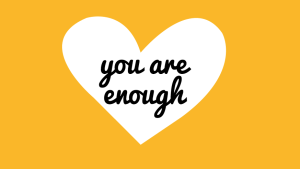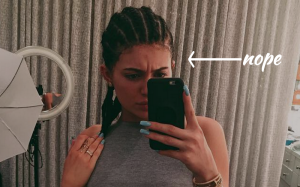Eating disorder recovery is confusing as hell.
Our doctors want us to fix our behaviors around food, our therapists want us to dig deeper to identify what we really mean when we say “I feel fat,” and our families and friends guilt us with “Where did we go wrong?” – all pulling us in different directions.
Meanwhile, we just want to get to a place where we don’t fucking hate ourselves anymore.
And it’s not like the body-positive movement’s go-to “Love yourself!” mantra is helping any.
Can we get an instruction manual?!
Well… yes.
Because I think it’s high time that someone created something to help us wade through this rough water that’s accessible, tangible, and easily digestible (ugh, no pun intended).
So I want to introduce you to the concept of the five love languages.
In short: Gary Chapman, in his book The 5 Love Languages: The Secret to Love That Lasts, posits that there are five broad “love languages” – or ways to communicate love to your partner – and that each of us needs to figure out how we give and receive love best in order to sustain healthy relationships.
And even if you don’t subscribe to the notion 100%, it’s a really good foundational framework for understanding what we (and our partners) need to feel loved.
But what about your relationship with yourself?
We know, as people who have made the brave choice to chase recovery, that something is broken. And likely, we’ve just been wondering where to find the (concrete) advice on how to fix it.
So, adopting the five love languages, let’s start here.
1. Words of Affirmation
In a romantic relationship, words of affirmation look like handwritten love letters, “The Top 30 Things I Love About You” e-mails, and remembering sometimes to say, “Babe, you’re really smart. I love the way you _____.”
So how can we translate that to our relationship with ourselves?
Well—give yourself some affirmation!
And, yeah, I know that probably a lot of you have gotten this advice before from your professional support team, if you have one, and even from loved ones. It’s a pretty common post-eating disorder tactic. And it’s also really hard.
When we’re talking about affirmations, it’s important to note that they often mean more when they’re specific. Think about what it feels like when a partner generically tells you that you’re “beautiful” versus when they point out that that tiny birthmark on your right shoulder is really cute. See what I mean?
Try talking to yourself like that.
One night, for example, I was having a really difficult time accepting my body, and so rather than distracting myself by thinking about something else, I forced myself to tackle it head-on: Aloud, I scanned my body from head to toe, naming what I liked about my different features.
I went from “I like my hair because it looks pretty whether it’s straight or curly,” “I like my eyes because they have a ring of gold around the irises, which makes them look like solar eclipses,” and “I like that I have a dimple in my nose,” all the way down to “I like my toes because they look like little jewels when they’re painted.”
By the end, I was smiling and happy, and I drifted off to sleep – safe, at least for that night, from negative thoughts.
But maybe you’re not in a place yet where you can easily name parts of your body that you love or things about your body that you like, especially physically – and that’s okay. Maybe instead, you can try an exercise in gratitude, thanking your body for what it’s done for you during the day.
For example, “Thank you, back, for being strong enough to help me lift that heavy box this morning” or “Thank you, feet, for helping me balance” or even “Thank you, eyelashes, for not letting any stray particles fall into my eyes today!”
It’s okay to start small.
But if writing is more your thing than talking to yourself (hey, to each their own), you could try writing a tried and true love letter to parts of your body that you’ve wished away. You can even Google a whole bunch of examples.
Or join me on Twitter, and post a #BodyLoveHaiku in the morning. I was doing it regularly at the beginning of the year as part of my own healing process, and I was amazed at how many thoughts I had swirling around about my body.
And if creativity isn’t your strong point, then pick up books of poetry that feature odes to body love – like Nayyirah Waheed’s Salt and Nejma collections or Rupi Kaur’s Milk and Honey – or an anthology of narratives like Body Outlaws: Rewriting the Rules of Beauty and Body Image.
Whatever path you take, make sure that you’re saying nice things to your body – and often.
2. Acts of Service
In a romantic relationship, this often looks like going out of your way to help your partner – by reading over and editing their resume, making sure the dishes are done before they get home, or offering to cook dinner.
Essentially, an act of service is anything that you can do to honor that life is hard and that we need a little bit of help sometimes.
Think: Actions speak louder than words.
And sometimes your body needs a bit of a break, too.
The thing is, a lot of us in eating disorder recovery have grown so out of touch with our bodies that we forget how to notice, acknowledge, and respect its inner wisdom. We’ve spent so much time defying and denying our bodies’ needs that we start to think we know better than our bodies.
But our bodies often whisper their needs to us. We just need to be better about paying attention – and retraining our neural pathways to respond appropriately to our bodies’ cues.
For example, your body knows what it needs to eat. (I know it’s easy to forget that, but I swear that it really does.) We’ve somehow convinced ourselves – even folks without eating disorders, thanks to the diet industry – that we control our bodies. But in reality, our bodies control us more than we like to think that they do.
And while sometimes my body says “I really want roasted carrots for lunch,” there are other times when it’s screaming “I need chocolate mousse cheesecake. Now.”
Relearn how to pay attention to that voice. Likely, you’ve been burying it for so long that you can hardly make it out. But give it permission to reach out to you, and eventually, it will again.
Similarly, your body knows when it needs a rest. It may be on your to-do list to go to the gym today, but if your body is suggesting that it needs a day off from cardio or strength training, chances are, it knows what it’s talking about. You can skip the workout every once in a while without guilt or shame. I promise.
Remember that none of these choices are more “healthy” or “moral” than any other.
So do your body an act of service. The next time that it asks for you something, acquiesce.
3. Receiving Gifts
This is one of my love languages, actually. If you date me, I’ll always be sending you notes in the mail and buying you little things that make me think of you – and I deeply appreciate the favor in return.
We can extend this generosity to our bodies.
Think: What is something that I can make or buy for my body that will make it feel exquisite?
For example, I have a lot of fun with makeup and get really excited when I find a lipstick shade that makes my lips – which is one of my favorite parts of my body – stand out. (PS: This is my current go-to, in case you need inspiration.)
Or what about some bath products that turn the banal act of washing into a divine experience? Because – believe it or not – taking the time to reconnect with your body while it’s naked is actually a deeply powerful act of revolution when you’re in eating disorder recovery. It’s facing everything that you dread head-on.
So indulge. Anything from sugar and salt scrubs to body conditioners to lotions to fragrances work – and a lot of these products can (magically) be made with stuff you might already have in your kitchen.
Manicures. Pedicures. Massages. Facials. Body treatments. Even the simplest acts of crawling into a bed with clean sheets or wrapping yourself with a dryer-warmed towel. Whether at the spa or in your own apartment, these are all examples of gifts that you can give your body.
Think of it as not only a token of appreciation for all of the amazing things that your body can do for you, but also a bit of an apology for what it’s gone through.
4. Quality Time
As far as Gary Chapman and his book are concerned, this refers to the necessity of spending time with your partner that makes memories, rather than simply sharing space in the same room.
For example, he might argue that watching trivial TV together isn’t quality time, whereas planning and going on a trip together is. It’s about forming a bond.
So, ask yourself: What are some activities that your spiritual and emotional self can enjoy with your bodied self? What are some ways for your spirit and body to connect?
For example, the practice of yin yoga in particular can be used in healing from trauma (including eating disorders!), making it a perfect companion to your journey. I take a yin class three times a week. For one thing, I walk away from the experience feeling much more in touch with my physical self than I was before I walked into the studio. For another, it calms and clears my mind.
Don’t have access to a studio? That’s okay! You can practice on your own. I’m a fan of Yoga with Adriene, but there are plenty of other self-teaching videos on YouTube, too!
Another great way to spend time with yourself, reconnecting your body and spirit, is through guided meditation – listening to someone take you through a series of thoughts that help relax you and infuse your mind with positivity.
I use the Silva Guided Meditation app that’s available on smart phones, but they also have a YouTube channel.
But what works for you? Do you enjoy reconnecting with nature through a hike in the woods? Did your eating disorder sap away your energy and desire to play basketball, which you used to love? Do you feel good curled up in bed with a good book?
If we want to repair our mental relationships with our bodies, we need to give the two – our brains and our bodies – some time to get to know one another for their strengths and weaknesses.
5. Physical Touch
Some people are more (what we might call) touchy-feely than others. Another way to describe this is with the phrase “skin hunger.”
It sounds kind of weird at first – I had a partner who would always forget the phrase and replace it with “hungry for skin,” which is terrifying – but it’s actually a really useful construct that describes something many folks understand: the need for physical intimacy.
And because we all have different levels of skin hunger, some of us need more (or less) touch in our lives.
In relationships, this encompasses the physical and sexual intimacy between people, but is generally used to describe sensual – rather than explicitly sexual – sensations. It’s kissing. It’s cuddling. It’s holding hands while walking down the street. It’s hugging. It’s nose rubbing. It’s running your fingers up and down the inside of someone’s arm.
And in the pursuit of self-love after an eating disorder, it’s finding a way to experience physical touch with oneself that feels both safe and satisfying.
This could look like running your fingers up and down the inside of your own damn arm. It could be giving yourself a light scalp massage (maybe with some coconut oil!). It could be taking the time to give yourself a foot rub at the end of a long day. It could be exploring the slick way that your skin feels when you’re soaking in the tub. And—yes—it could also be masturbating.
It can be anything that simultaneously makes your body feel good physically and gives you a sense of happiness or contentedly emotionally – because it’s likely been so long that you’ve been able to feel those things concurrently.
And you deserve that.
***
Regardless of the relationship into which we’re venturing, it’s necessary for us to understand how to show and feel love. Otherwise, we find ourselves shouting words into the void without any real understanding of how to make them meaningful and palpable.
And when entering – or reentering – into a loving relationship with your body, you are allowed to give yourself this same courtesy.
Body love is hard when we’re not sure what it looks like. Eating disorder recovery only makes it harder.
So hopefully this can be a place to start.
[do_widget id=”text-101″]
Melissa A. Fabello, Co-Managing Editor of Everyday Feminism, is a sexuality educator, eating disorder and body image activist, and media literacy vlogger based out of Philadelphia. She enjoys rainy days, Jurassic Park, and the occasional Taylor Swift song and can be found on YouTube and Tumblr. She holds a B.S. in English Education from Boston University and an M.Ed. in Human Sexuality from Widener University. She is currently working on her PhD. She can be reached on Twitter @fyeahmfabello.
Search our 3000+ articles!
Read our articles about:
Our online racial justice training
Used by hundreds of universities, non-profits, and businesses.
Click to learn more
Most Read Articles
- « Previous
- 1
- …
- 30
- 31
- 32




















